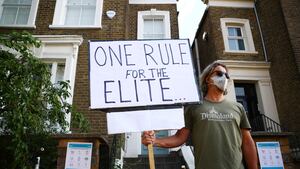Just as is the case for ex-American presidents, it’s rare for former British prime ministers to criticize their successors—and rarer still for them all to argue for the same side. But, as in the U.S., convention has been forced aside by a wildly unpredictable office-bearer who has repeatedly refused to govern within the normal rules.
As of Monday, all five living ex-prime ministers had created the poshest gang imaginable and teamed up against the incumbent, Boris Johnson, as he steamed ahead with his plan to break international law to push through his controversial Brexit vision.
Theresa May, David Cameron, Gordon Brown, Tony Blair, and John Major—three ex-rulers from the Conservative party and two from the Labour party, who span the last three decades of British history—have hit out at Johnson’s attempt to toss aside the Brexit withdrawal agreement he struck with the European Union last year.
The prime minister is also being met with growing rebellion among his current crop of Conservative lawmakers, but still appears to have enough support to see the bill through a vote on Monday.
The row is over a technical but critically important detail. Johnson’s plan would see a key part of Britain’s withdrawal agreement with the EU—an international treaty since the U.K. left the bloc in January—overridden by a piece of British legislation designed to ensure the continuation of barrier-free trade in the U.K.’s four nations.
Last week, one of Johnson’s ministers openly admitted the government’s plan would break international law in a “specific and limited way” by superseding terms already agreed with the EU. That would likely damage Britain’s reputation as a small but still-influential and steady international player, though it will also be met with approval from Johnson’s Brexit-supporting voters.
Cameron, who argued against Brexit but happily organized the referendum which saw the British people back the idea, told reporters on Monday: “Passing an act of Parliament and then going on to break an international treaty obligation is the very, very last thing you should contemplate. It should be the absolute final resort.”
Blair and Major, one Labour and one Conservative leader who both helped to achieve peace in Northern Ireland in the 1990s, wrote a joint article in the Sunday Times that accused Johnson of “embarrassing” the nation. They also urged lawmakers to reject the “shameful” attempt to break international law, which they said would endanger decades of peace at the Irish border.
May, who was Johnson’s immediate predecessor, said breaking international law would damage “trust” in the U.K., and Brown said it effectively be an act of “self-harm” for the country.
Johnson is also facing a storm of criticism from his lawmakers inside Parliament—the highest ranking of which is ex-attorney general Geoffrey Cox, the former top legal adviser to the government, who said that the prime minister’s plan would cause “very long-term and permanent damage to this country’s reputation.”
Johnson’s special envoy for Freedom of Religion or Belief, Conservative lawmaker Rehman Chishti, has stepped down over the proposed changes, saying, “I have always acted in a manner which respects the rule of law... [and] voting for this bill as it currently stands would be contrary to the values I hold dearest.”
Despite the wave of criticism, the government is expected to win a vote in Parliament Monday night on the next stage of the bill, though it could run into more parliamentary roadblocks in the several debates and votes in both houses before the bill can become law.
The government has called the bill a mere “insurance policy” that would only come into play if the U.K. and EU can’t agree a trade deal for when Britain fully extricates itself from the bloc.








